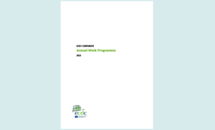ECDC Annual Work Programme 2013
As stated in Article 14.5(d) of ECDC’s Founding Regulation, [The Management Board shall:] “adopt, before 31 January each year, the Centre’s programme of work for the coming year.” The ECDC Annual Work Programme 2013 is based on ECDC’s Strategic Multi-annual Programme (SMP) 2007-2013. The activities to be developed in 2013 are therefore clearly and individually linked to the long-term strategies of ECDC.
According to the ECDC Strategic Multi-annual Programme, for the period 2010-2013, ECDC should consolidate its Public Health Functions (surveillance, scientific advice, preparedness and response, health communication), while at the same time reinforce and give more visibility to the Disease Specific work. The adoption of long-term strategies for the Disease Specific Programmes by the Management Board in November 2009 complemented the Multi-annual Work Programme for the period 2010-2013. Partnerships (including Relations with Member States and External Relations) are at the core of ECDC missions. ECDC will work on further improving its cooperation with the EU institutions, Member States, other public health partners and external partners, through the streamlining of its cooperation principles, structures and practices. As for 2012, some cross-cutting activities will be particularly emphasised. Specific strategies covering all parts of the Centre have been developed in four areas: measles elimination, health inequalities/migrant health, microbiology coordination, and support to candidate countries.
Executive Summary
As in the previous years, ECDC work for 2013 is planned on a yearly basis in an Annual Work Programme with a medium term “rolling time horizon”, which is based on the Strategic Multi-annual Programme (2007-2013). In this way ECDC’s day-to-day work is linked to its longer-term goals and official mandate. It subsequently outlines the major priorities for the seven target areas, as well as for some management issues. It also refers to the ‘ECDC Strategies for Disease Specific Programmes (DPs) 2010-2013’ adopted by the Management Board in November 2009.
The planning process started earlier this year to comply with the recommendation of the Internal Audit Service of the Commission, in order to better align with the budget cycle and provide relevant input in due time in the EU budgetary discussion process. The Work Programme for 2013 has been prepared with a clear focus on ECDC values, developed in 2010: “service orientation”, “quality based” and “one ECDC”.
Main priorities of the 2013 Work Programme:
- According to the Strategic Multi-annual Programme 2007-2013 (SMP)1 , from 2010 onwards, ECDC should further consolidate its Public Health Functions now fully in operation (surveillance, scientific advice, preparedness and response, health communication) and give a higher priority to diseases specific work. This process is supported by the long term strategies for the Disease Specific Programmes adopted in November 2009 by the Management Board , as a complement to the SMP.
- Building Partnerships will remain a high priority in order to further improve ECDC’s overall cooperation with the EU institutions, Member States, other public health partners and external partners. ECDC will also strengthen its relations with the EU Candidate Countries and Potential Candidates, European Neighbourhood Policy countries, and other international institutions.
- In 2013, the Centre’s budget request is the same as for 2012, with 58.2 M €, while the total number of staff should slightly decrease from 300 to 298, due to the requested staff reduction of 1% over the next five years. ECDC Work Programme includes the full Activity Based Budget, providing the real cost of activities for the centre.
As for 2012, some crosscutting activities will be particularly emphasised. Specific strategies covering all parts of the Centre have been developed in four areas:
- Advancing measles elimination in Europe: ECDC will put specific efforts to contribute to the renewed commitment to eliminate measles and rubella from Europe by 2015, by putting specific efforts in carrying out activities in terms of advocacy, communication and scientific advice to support the Member States to reach the elimination goal.
- Strengthening the microbiology laboratory capacity in Europe: ECDC will consolidate the laboratory capacities in the Member States to meet the requirements of Eu communicable disease surveillance and alert through further support and cross disease coordination of reference laboratory networks, training courses and quality assessment schemes.
- Vulnerable populations, including migrants and Health inequalities: ECDC will address the cross-cutting topic area of health inequalities, in particular migration and infectious diseases in the Eu by developing a strategy and targeted initiatives in this field.
- Collaboration with the EU enlargement countries/assessment visits: The priority for ECDC working with enlargement countries is to support them to fulfil the requirement of the EU acquis in the area of communicable diseases. With the financial support from the Commission, ECDC will provide the European Commission with technical assessments on progress made by the EU enlargement countries on the basis of mutually agreed procedures The implementation of the Work Programme for 2013 is conditional upon the approval of the corresponding budget by the relevant authorities
Download

Read more on the ECDC website
ECDC corporate
ECDC strategic multi-annual programme 2007–2013
Public health activities, disease-specific programmes and multilateral partnerships.







